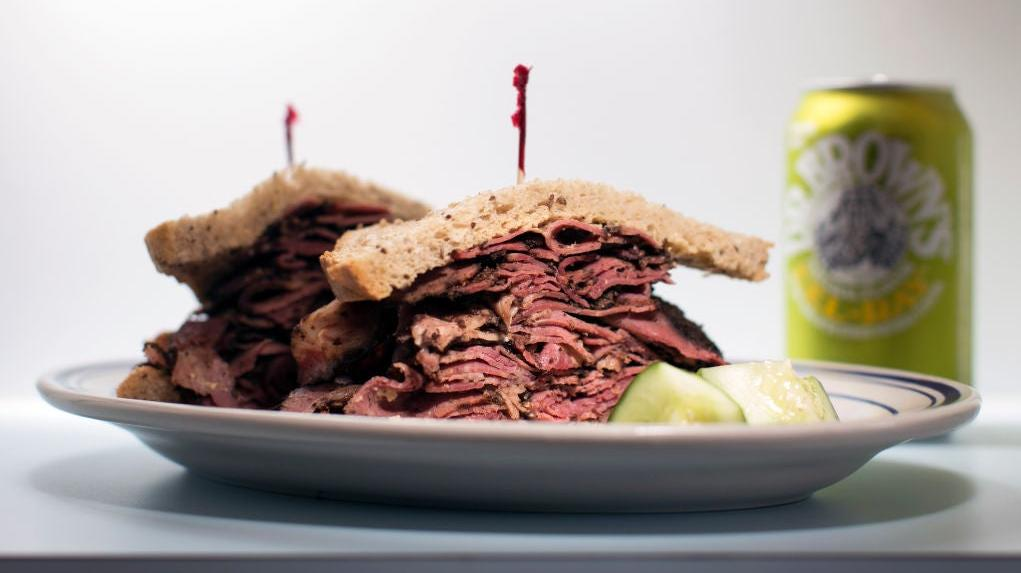What Should Restaurants Do About Rising Food Prices? [Updated]
Update, June 4, 2021: Faced with the rising price of, well, everything (beef, cheese, even paper bags), another restaurant owner, Lex Gopnik-Lewinski of Augie's Montreal Deli in Berkeley, California, tried reducing portion sizes and increasing prices. He didn't feel good about it.
"I don't know, maybe it's the Canadian in me, but we really want to have value and feel like people are getting a fair deal for what they're paying, and we're already kind of a more expensive sandwich," he told SFGate. "... So we looked at what the pricing would have to be, and it would just be too expensive. It would turn off our customers. And we would just feel kind of crappy about it."
And so he came up with another solution: to close Augie's altogether until prices go down to a level he can afford.
This is probably the most extreme solution of all the Bay Area restaurateurs SFGate surveyed, but everybody is having trouble. Joe Trez, the owner of a chicken wing restaurant, said that the cost of a case of wings is now more than double the price around Super Bowl season, which is usually when the price of wings peaks, and a few weeks ago his supplier could only get him two cases instead of the usual 12. He's also short on the canola oil he uses for frying and to-go containers.
Suppliers explained that they've been hit from all sides. Meatpackers in the Midwest are operating under a labor shortage and have only been at about 60% capacity. International shipping has slowed. There's been an increased demand for all sorts of protein, but especially chicken, thanks to the chicken sandwich madness. Increased demand and decreased supply, as we know, leads to inflation. It's a mess that one supplier doesn't think will be resolved until the fall.
"I didn't realize how good I had it even six months ago," said Trez, the chicken wing man.
Original post, May 13, 2021: There may have been worse times to be a restaurant owner than this particular moment, but even with government recovery grants rolling in, there are still a myriad of problems: ever-changing regulations that limit customers, predatory third-party delivery apps, lack of staff (or the realization among staffers that they are finally in a position to demand better wages), the exhaustion that comes after more than a year of quarantine, and now rising food prices.
Ursula Siker, the chef and owner of Jeff & Judes, a self-described "Jew-ish deli" in Chicago's Humboldt Park neighborhood, addressed the last issue in an Instagram post yesterday.
"With U.S. restaurants reopening at breakneck speed, there have been massive pressures put on our agriculture & farming industry," Siker wrote. The post goes on:
As a result, we are seeing prices skyrocket across the board (for example: a case of chicken thighs was $24 a month ago, now it's at $60). We are currently being hit hardest by brisket. What used to be $3.50/lb is now $4.75. To break it down: we receive cases of whole briskets at the deli which we then trim (about 40% of the weight we receive is fat we remove), and then cook (we lose another 20-30% during the cook). At the end of the day, we will frankly go out of business if we continue our current production unless we make our sandwiches $25 (which is a lot to ask of our guests' wallets). So for now, we will just have to make less.
Siker has already begun to supplement her house-cured corned beef and pastrami with products from Vienna Beef and will be selling all her products first come, first served. When she runs out, she won't be making more. As spring goes on, she'll be adding more "veg-centric" specials to take advantage of the produce emerging from local farms.
In general, Siker's customers thanked her for her transparency and assured her they would be happier eating more vegetables and less red meat (although one commenter did ask if it would be possible to add liver and tongue to the menu—but only if they were cost-effective). But her message did make me wonder how other restaurant owners are handling the price increases and limited quantities. Some, we know, have cut out meat altogether. What other solutions are there?
